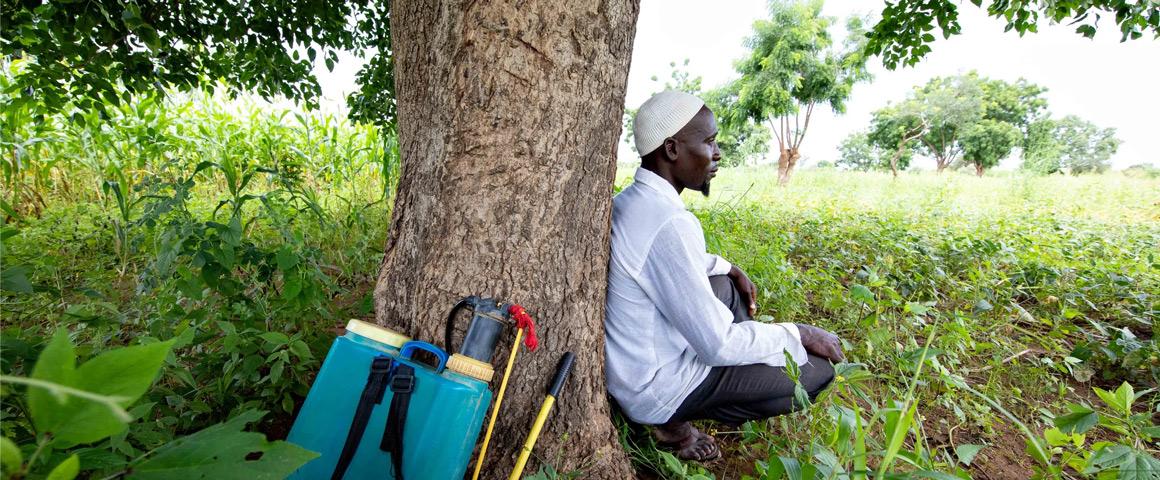Expert view 27 September 2023
- Home
- Press area
- Press releases
- Innovative alternatives to pesticides
Innovative alternatives to pesticides: a vital issue for the future of farming

Synthetic pesticide use has increased considerably over the past two decades in tropical countries © R. Belmin, CIRAD
There is now a broad scientific consensus on the threats pesticides pose for the environment, biodiversity and human health. However, there is also strong resistance to restrictions or bans on pesticide use. According to social scientists who recently produced a special issue of the journal Environmental Science and Policy, many players are refusing to see their routine or their economic model questioned. However, innovations are coming to light worldwide, particularly in Latin America. To "get away" from synthetic pesticides, which are still widely used in agriculture, alternatives are emerging at the interface between research laboratories, industry, farmers, and sometimes citizens.
The team of researchers looked at two main types of alternatives to pesticides:
• solutions based on substitution, with technologies such as biocontrol;
• those based on an in-depth overhaul of cropping and agricultural production systems, switching to organic farming or agroecology, using a range of techniques such as crop diversification, use of organic products (manure, compost, etc), and crop rotation.
"In addition to their agronomic characteristics, these alternatives differ in terms of their social pathways, the players defending them and the degree to which they restructure food systems", says Eve Fouilleux, a political scientist from CNRS and research associate at CIRAD.
Biocontrol, a hugely promising technology
The extent to which public policy on pesticide issues takes on board these different solutions varies depending on the context in individual countries. In France, for instance, and in countries that export agricultural products, such as Argentina and Brazil, biocontrol is seen as a hugely promising technology that would sustain high productivity without fundamentally disrupting the conventional agricultural model, or its various socioeconomic forms. "Within the extended biocontrol family, the development and use of microorganisms in particular is a major technological and scientific front across which governments are encouraging researchers, industry and farmers to work", Frédéric Goulet, an innovation sociologist from CIRAD, reports.
Public support of organic farming
However, focusing on biocontrol is putting other possible solutions in the shade, revealing a degree of competition between alternatives that are more or less onerous in terms of changing practices. This applies to organic farming, which receives very little public support in France and in other agro-exporting countries but much more in northern European countries, for instance. One of the articles in the special issue explains how, via different institutional pathways, Sweden and Denmark have managed to reach a target of 80% organic food in canteens.
Allowing for the diversity of stakeholders
The articles in the issue are the result of social science research that stresses the importance of allowing for the diversity of stakeholders and processes involved across a food system. "This way of addressing technological change in the agricultural sector means overcoming technological reductionism in order to demonstrate that technologies are not chosen for their productivity alone, but because they are seen as more legitimate or more promising than others at a given time", Frédéric Goulet stresses.
Promoting one alternative rather than another is also a sign of the greater importance accorded to some types of scientific expertise in relation to others (scientific disciplines or lines of thought within a given discipline). The two articles on France, which look at the Ecophyto plan and the instruments adopted to regulate glyphosate use, clearly show how the type of experts consulted determines the decisions made.
Reference
Moving beyond pesticides: Exploring alternatives for a changing food system
https://doi.org/10.1016/j.envsci.2023.06.007
In another article in the Journal of Rural Studies, Frédéric Goulet, an innovation sociologist from CIRAD, calls for thought to be given not only to the type of inputs used but to how they are produced and how farmers access them. He looks at the use in Brazil of microorganisms (bacteria and fungi) for which EMBRAPA or private firms selected and improved strains, enabling a reduction in nitrogen and phosphate fertilizer and pesticide use. He shows that over the past decade, large numbers of Brazilian farmers have begun producing microorganisms on their farms in order to cut their production costs and dependence on synthetic inputs and the firms that produce and market them.
Reference
On-farm agricultural inputs and changing boundaries: Innovations around production of microorganisms in Brazil
https://doi.org/10.1016/j.jrurstud.2023.103070
Biological inputs for agricultural use are commonly known as bioinputs (bioinsumos) in Latin America. They include both biocontrol products and biofertilizers.
This can mean alternatives to fertilizers such as:
- Biofertilizers, which are used to enrich soils. These may be based on organic matter (manure, plant waste and compost) or microorganisms, such as bioinoculants.
- Bioinoculants are primarily produced from laboratory-bred nitrogen-fixing or phosphorus-dissolving bacteria. Those bacteria naturally live in symbiosis with legume crop roots (soybean, chickpea, beans, etc), capturing chemical elements from the air and the soil and converting them into a form that can be taken up by plants, or facilitating mineral uptake via plant roots.
Biocontrol, an alternative to pesticides, refers to a range of biological techniques used to fight pests and diseases (microorganisms, insects, mites, nematodes, etc). There are four main types of agents:
> invertebrate auxiliary macroorganisms, such as insects and mites;
> microorganisms (fungi, bacteria, viruses);
> chemical mediators, mainly including insect pheromones;
> natural substances of plant, animal or marine origin.
Find out more: Biological inputs are booming in South America
























